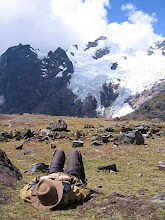
picture of a quiet day on the trauma side...
So, www.ted.com is a great website full of a bunch of talks on various topics (a few of my favorites can be accessed through my Facebook page..) It's a meeting of a bunch of folks out in Monterrey who every year get together and discuss-- whatever. A few years ago, the topic was Africa-- basically all kinds of aspects. One speaker in particular caught my attention with his metaphor for the crisis in leadership in Africa. I believe he was from Kenya, but I'm not sure (and no, Kenya does not compete in lacrosse with Earlham and Dennison...). There are two types of leaders in Africa, he said. There are the young, hungry immediately post-student or student generation who are looking for things to change and change quickly. Who see the world forgetting Africa and are looking to catch Africa up to take its place among nations (though granted, this could take generations). He referred to them as the Cheetahs. Then there are the other African leaders. Concerned primarily with their own station, and therefore the status quo. Who take no initiative and at times block innovation to maintain their position. Who can only see the watergrass in front of them and do not look to the horizon of the future. These are the Hippos. More often than not, he observed, the Hippos tend to be in charge and entrenched (ever tried to move a hippo?). And it is their weight that is a part of the problem holding Africa back.
I found that observation to be interesting, and not just relevant to Africa. Leaders tend to be like parents-- the big challenge is knowing when to step aside and let what you've built or raised come into its own. Of being confident enough in yourself and your work to let it outlast you (and of ensuring that you are building something that will outlast you, that, in the end, will make you unnecessary). And that's the challenge. As we grow old and “experienced,” professionally, we are every more concerned with our own mortality or career longevity. Frailty begets conservatism and fear of letting go. This is probably adaptive-- you bounce back less when you osteoporotic (metaphorically speaking, of course).
In the end, I think it was said best by Lao Tsu: Go to the People. Live among them. Love them. Learn from them. Serve them. Plan with them. Start with what they know. Build on what they have. And when the best leaders leave, the people will say, “We have done it ourselves.”
What I find interesting is that it implies/assumes that the best leaders leave. What happens to them then? One can only hope they were able to be part of something that they are proud to see outlast them.

No comments:
Post a Comment